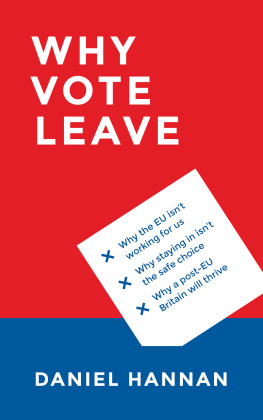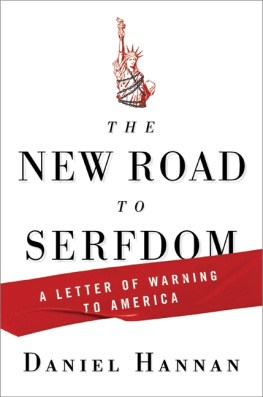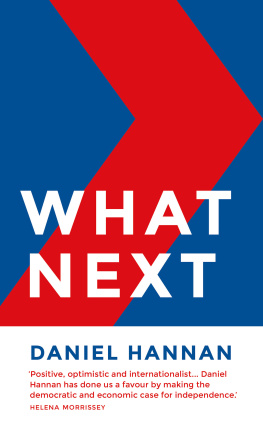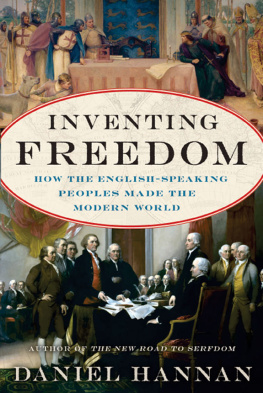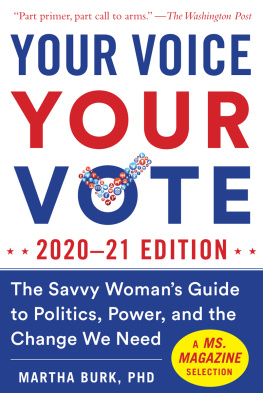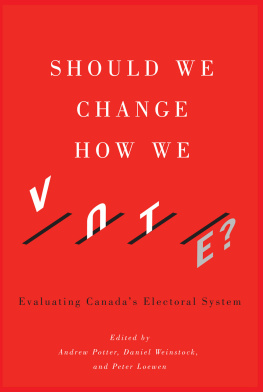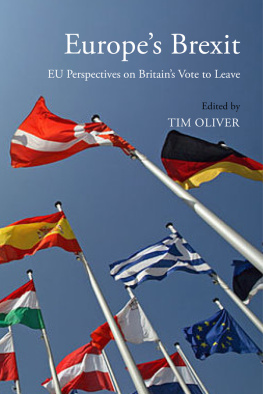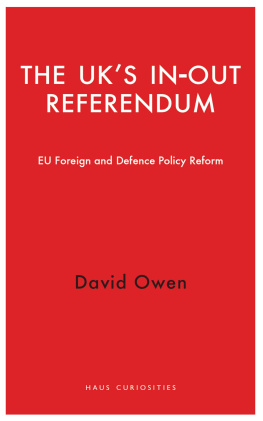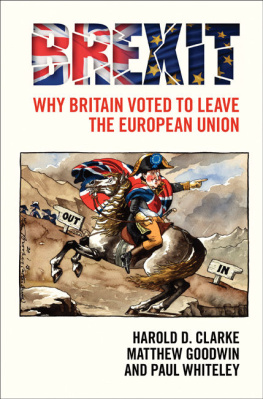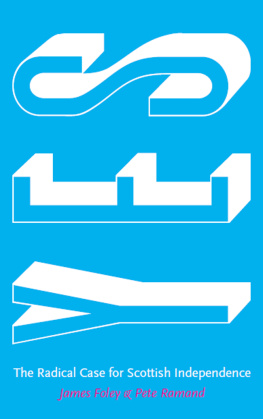WHY VOTE LEAVE
Daniel Hannan
www.headofzeus.com

MEP and award-winning political writer Daniel Hannan argues for a British exit ahead of the coming referendum.
Hannan demonstrates that the EU is past its sell-by date, rendered obsolete by technological advances, shrinking economically and less relevant to our economic needs than ever. Worse than that, he shows that the EU cant reform, cant be democratic and cant be divorced from its goal of ever-closer political union. Staying in does not mean staying the same and a vote to leave far from being the risky choice is actually the safe one.
Finally, Hannan argues that Britain doesnt have to stay in the EU to remain at the heart of Europe and considers the global role a confident nation freed from EU strictures could play.
Contents
On 23 June 2016, against all the odds, the United Kingdom voted to leave the European Union. For once, the phrase against all the odds is literally apposite, the bookies having put Brexit behind throughout the campaign, and given it just an 18 per cent chance of success on eve of poll.
I hope this post-referendum edition of Why Vote Leave will help explain that extraordinary result. During the campaign, this book was in the best-seller lists in the Sunday Times, Amazon and W.H. Smith something highly unusual for a political tract. It provided the script for the Vote Leave campaign, setting out the democratic, constitutional and commercial arguments for leaving the EU.
These arguments are worth recalling because, since the poll, a grotesque caricature has grown up which imagines Leave voters as anti-immigrant chauvinists. I say since the poll, but in truth this caricature was born during the campaign. What has changed is that some Remainers have now taken to believing it. What began as a debating point is in danger of becoming a genuine impression. If were not careful, policy will be drawn up with these imaginary racists, these Frankensteins Leavers, in mind.
It has to do mainly with shock. The result caught pundits, punters and pollsters off-guard, and small wonder. The imbalance of forces during the referendum campaign had been immense. Remain was backed by all the main parties; by the CBI, the TUC, the NFU, the BMA and every other trade association; by the mega-banks and the multi-nationals; by the machinery of the state; and by every foreign head of government from whom David Cameron could call in a favour.
Financially, too, the contest was stacked in Remains favour. The two sides spending was limited by law during the final weeks of the campaign, with the official Leave and Remain campaigns each allowed to spend 7 million. But political parties with parliamentary representation were allowed to spend extra sums outside that cap. In practice, this meant that Remain was able to draw on the allocations of Labour, the Liberal Democrats, the Greens, the SNP, Plaid Cymru, the UUP, the SDLP and Sinn Fein, while Leave had only the relatively small envelopes of the DUP and UKIP and, frankly, some of the UKIP money was spent in ways that did Leave no favours. (The Conservative Party, being neutral, did not use its allocation for either side.) In total, this gave Remain a limit two-and-a-half times that of Leave.
An even larger imbalance applied before the statutory limits took effect. As well as corporate donations from Goldman Sachs, J.P. Morgan and various other behemoths invested in the EUs regulatory regime, Remain spent an eye-watering 9.3 million of taxpayers money in the form of an official government brochure, sent to every household, telling people to vote for membership.
With so much else happening at the time, that decision attracted less criticism than it might have done. Here was the government drawing on state resources to advance a narrowly partisan objective and doing so with the laughable justification that its propaganda was factual. To see how outrageous it was, try to imagine the present government, a few weeks before the next general election, spending 9.3 million of state resources on a leaflet that sets out the factual case for voting Conservative. Its hard to see any legal, political or moral difference between the two scenarios.
Having tilted the playing field in terms of finance, the authorities displayed a similarly lopsided attitude to the process of the vote. Under British electoral law, the franchise is restricted to British nationals who have lived in the UK within the last 15 years as well as Irish and Commonwealth citizens in the UK at the time of the election. The referendum was, quite rightly, conducted in line with these rules, albeit with two minor tweaks: members of the House of Lords were allowed to vote (because they were not electing the House of Commons), as were citizens of Gibraltar, the only British dependency also in the EU.
Despite these rules, a number of local authorities mistakenly sent postal ballots to EU nationals, who could vote at local and European elections, but not in the referendum. Several recipients of these ballot papers cheerfully Tweeted pictures of themselves voting by post. When Vote Leave complained that the integrity of the election was being compromised, it was told, in effect, that the infractions were few, and that little could be done about the irregular postal votes.
When, by contrast, Remain campaigners agitated for an extension of the registration period, following a last-minute rush that had crashed the website, a very different attitude prevailed. Despite the registration timetable being clearly laid out in law, the authorities stepped in and prolonged it, the assumption being that such a prolongation would mean a higher turnout among young voters, who were likelier to vote Remain. Again, just imagine a similar thing happening at a general election the governing party altering the timetable laid out by law in the hope that it would benefit electorally. There would be outrage.
The odds, in short, were stacked logistically, financially and legally in favour of Remain. Curiously, though, the biggest headache for the Leave side came, not from these asymmetries, but from the antics of a UKIP donor called Arron Banks, who set up a rival campaign and then used it to attack the official Leave organisation, to which he referred as the enemy. It was no idle turn of phrase: throughout the campaign, Banks waged war against the Leave campaign rather than against the EU, sending lawyers letters to its spokesmen and even making public the mobile phone numbers of its staff and urging people to spam them.
The Remain campaign could not have wished for more propitious circumstances in which to launch a referendum. It enjoyed a vast financial advantage; it had the entire Establishment on its side (any doubt about the continuing existence of the British Establishment has surely now been dispelled); it had a beautifully-positioned ally in Arron Banks; it had enormous numbers of tame EU-funded NGOs, universities and international think-tanks to broadcast its scare stories. And yet, when polling day came, Britons voted to leave the EU in greater numbers than they had ever voted for anything.
This point is worth stressing because not all Remain campaigners, at the time of writing, have accepted the outcome with equanimity. In the five stages of grief, some appear stuck between one (denial) and two (anger).
Shortly after the vote, thousands of Remainers marched on Parliament to tell MPs to ignore the electorate. Millions more signed a petition demanding a rerun. The law firm Mischon de Reya was hired to try to prevent the PM from initiating the disengagement without a vote in Parliament. Tony Blair said he wanted to drag things out until people changed their minds.

